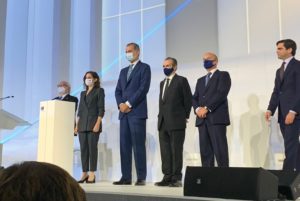A mandatory Covid-19 vaccine mandate came into effect in Italy on Friday, October 15th that requires a Green Pass to enter any workplace. Various protests and strikes have taken place throughout the country that day in response to this.
A Green Pass certificate is issued once someone is fully vaccinated or immunized against the Covid-19 virus. The new mandate states that “the possession and display, on demand, of the Green Pass are required to access workplaces”. This applies to people working in public or private sectors.
There are only a couple of alternatives for citizens without a Green Pass. One is taking an antigen or PCR test every 48 hours and showing the results every day at work. However, tests can cost anywhere from €15 to €100 so this strategy is not considered viable in the long run. The other alternative to vaccination is unpaid leave. Fines for noncompliance can cost up to €1500. So far, Italy is the only Western democracy to implement such strict measures to encourage vaccination.
Since its announcement, this mandate has sparked countless demonstrations against Prime Minister Mario Draghi’s technocratic government. Highways in Genoa were blocked by protestors and one of the access points to Trieste’s port was blocked by 5,000 workers. Some protests were dispersed by the police using tear gas and water canons.
The biggest demonstration took place on October 9th in Rome in anticipation of the law coming into force. The protest was taken over by the fringe right-wing political party Forza Nuova (New Force). It turned violent and left 38 policemen wounded. Dubbed the “No Green Pass” demonstration, it started with a 10,000 people sit-in at Piazza del Popolo, one of Rome’s main squares. Protesters then moved to both the Chigi Palace (the Prime Minister’s residence) and the headquarters of the Italian General Confederation of Labor (CGIL), Italy’s biggest trade union. These two locations saw the aggressive side of the protest, with protesters throwing cherry bombs at the police and entering the CGIL in a violent assault.
The events of the protest led to renewed tensions regarding neo-fascism in Italian politics. Politicians on the left, such as former Prime Minister and current Democratic Party secretary Enrico Letta, denounced the hijacked protests as “fascist violence”. On the other hand, right-wing politicians in opposition to the government’s decision have been attempting to keep the focus of the conversation on the new Covid law. For instance, Brothers of Italy party leader Giorgia Meloni stated, “I don’t know what the origin of that protest was, maybe it’s fascist, maybe it isn’t fascist, that’s not the point” at Vox’s national convention in Madrid on October 10th. Letta countered this by claiming that Meloni was speaking at the convention of “a neo-Francoist party”. This past Saturday, labor unions organized an anti-fascist demonstration in Rome, with 50,000 people in attendance.
Despite the ideological turmoil, Italians have had to deal with the practical repercussions of this. Many vaccine-averse Italians have been calling in sick, others have compromised and decided to work less days per week to save money on swab tests.
This new law has also caused divisions within Italian society. Erica Ricci, a 49 year-old Italian teacher in favor of Draghi’s decision, describes a tense atmosphere, saying “you have to avoid the subject” of vaccination when socializing. She also feels “lots of aggressiveness” in the air nowadays. As protests cool down in Italy, the long-term effects of Draghi’s new Covid mandate remains to be seen.






